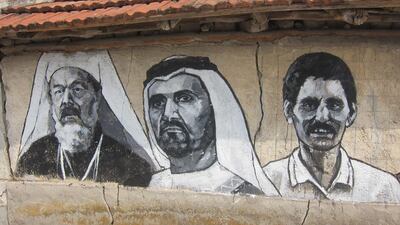I wasn't surprised to know that a mural in a remote place in Bulgaria featured the Vice President and Ruler of Dubai (Sheikh Mohammed bin Rashid painted on mural in remote Bulgarian village, September 25). After all, he is one of the modern world's greatest visionaries who transformed Dubai from a desert into one of the best places in the world for business and leisure. He deserves the highest respect and credit for that.
Jerry Almeida, India
If there were five more leaders like Sheikh Mohammed, the world would be different. I am lucky to be able to live here.
Victoria Michaella Lestenko, Abu Dhabi
Syria bombing wasn’t ‘accident’
There was no "accidental bombing of Syrian troops" (Obama's failure in Syria will haunt his successor, September 25). And what is "Russia's duplicity"? Russia has been openly and proudly supporting Bashar Al Assad.
The US, on the other hand, has been saying something and doing a completely different thing, including supporting factions of extremist groups with Turkey.
Name withheld by request
Is there any charm left?
It doesn't seem to be worthwhile being away from your family any longer, not contributing to your pension and, quite frankly, stagnating in your career and professional development (UAE slips in rankings for preferred expat destinations, September 27). You can barely save these days.
Sara Smith, Dubai
The UAE’s attraction doesn’t lie only in high salaries and the saving potential it offers.
One of the biggest draws of the country is that it offers a high quality of life in a safe environment, compared to most countries in the region and beyond.
Firas Barqawi, Abu Dhabi
Challenges to Emiratisation
Regarding the article The majlis: How can Emiratisation aims be continued? (September 22), a no-nonsense discussion on tackling the allegedly poor ethics of same-nationality recruitment and nepotism in private-sector firms may be a starting point.
For example, unscrupulous hiring managers may be operating privately run firms as immigration and labour facilitation centres in order to give residency and jobs to friends and family.
In that scenario, Emiratis could be automatically excluded because they represent an outside threat to such hiring managers, who may possibly hold a prejudice against Emiratis.
It also may not be uncommon for a parochial hiring manager with a broken moral compass to favour the easy candidate option of home-country culture and language in all their people sourcing, exclusively.
A dire absence of diversity in recruitment could represent one of the toughest barriers to citizens having the opportunity to participate in some private sector firms.
Timothy John Holmes, UK
I have developed enterprise and employability models for governments – and training is only the first part.
You need to embed the learning through work-based assignments and mentoring. But there are too many people with the wrong titles – the journey is a long one and you can’t expect to become a good leader/ manager without putting time and energy into it.
Neil Fogarty, Abu Dhabi
Culture isn’t a static concept
In reference to Faisal Al Yafai's opinion article Is cultural appropriation silencing the Middle East?, September 27), cultural appropriation is a complex topic, because no one "owns" culture. It's an evolving concept that's never rooted.
As you try to define it, it’s changing. We can only see the culture looking in the past after experiencing it and moving beyond.
Chris Reid, Dubai

